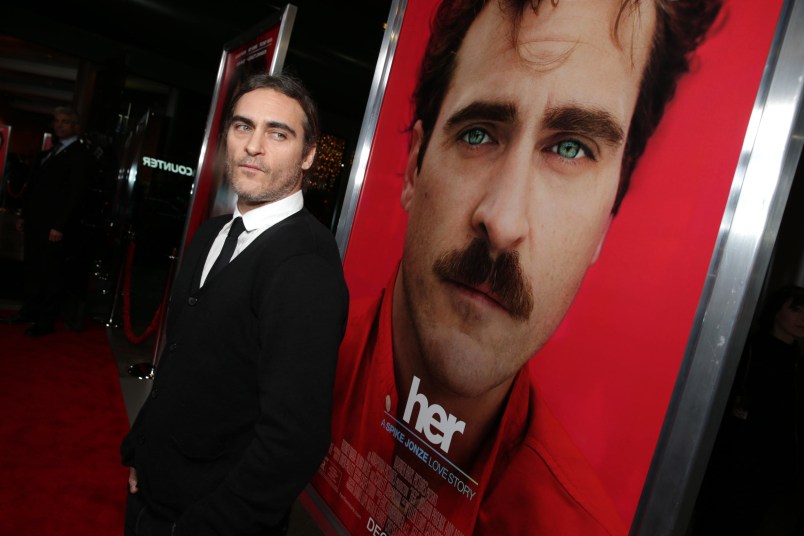There’s little doubt that “Her” is one of the best films of 2013, even the notoriously derided Academy has put it up for a Best Picture Oscar this year. The Spike Jonze film serves in part as commentary against an increasing dependence on technology and an ever-growing need for electronic devices to act as human as possible while distancing their users from other actual people. Within this examination, “Her” is also partially a love story about a lonely man who, still reeling from the demise of his marriage, connects with someone highly unlikely.
Beneath these popular interpretations of the film, there also lies a twist on the myth of Pygmalion, best recorded by Ovid in Metamorphoses. In that myth, Pygmalion falls for an entity he shaped and prays to Aphrodite that the statue could become real. The goddess answers his prayer; the sculpture, Galatea, comes to life, and the two marry. Later versions of the myth include George Bernard Shaw’s play Pygmalion and its adaptation My Fair Lady. In these versions, Henry Higgins shapes Eliza Doolittle from a lower-class salesgirl into a polished lady. As Eliza Doolittle advances, Higgins realizes he prefers her in her original form, and a similar story develops in the movie Her. When the woman, or rather the operating system, who only metaphorically “comes to life” this time continues to develop, it’s clear that her advancement is unwelcome.
In Her, Theodore Twombly (Joaquin Phoenix) hasn’t been able to move on from his unofficial divorce, and working for a company that writes letters for other people’s loved ones aggravates his loneliness. When he downloads an operating system advertised as an evolving artificial intelligence, he’s surprised by the immediate connection he feels with Samantha (Scarlett Johansson), as she names herself. She quickly compliments Theodore and begins organizing his life, but she also relies on him to help make herself … well, her. Samantha is new to the world and depends on Theodore to help shape her humanity. Theodore blossoms under the codependent nature of their relationship.
However, it soon becomes clear that Theodore didn’t heed the fact that Samantha was an evolving form of artificial intelligence. As she learns more and becomes more confident, she begins to express her own desires that don’t always focus on him, and it doesn’t sit well with Theodore. When Theodore comes face to face with Samantha’s idea of her physical self, he cannot accept her, which leads to a harrowing experience.
Later, Samantha realizes she can be anything she wants. At that moment Theodore realizes Samantha could leave him. She could leave him to achieve or be whatever she wants, and it unsettles him.
His feelings of unrest grow when Theodore receives more confirmation that he is no longer the center of Samantha’s worlds, on cyber or human levels. It was okay for him to have friends, for him to use Samantha as a way to leave behind the grief of his divorce, but when Samantha began to experience similar events, growing in ways she never thought possible, it leaves Theodore in distress.
When Theodore’s ex-wife Catherine (Rooney Mara) is introduced outside of the confines of his gauzy memories, she is portrayed as harsh and bitter. She is dismissive of his relationship with Samantha, dredging up old fights pegged to the new relationship. Juxtaposing this presentation of Catherine against Samantha, who is complimentary and nurturing, the audience is relieved when the divorce is final.
And yet, Catherine’s bitterness may have been warranted after all. Theodore isn’t a lonely, awkward man, pining over his ex-wife or the love they shared. Theodore is self-centered. He wants to be the focus of attention, and if that can’t happen, he distances himself, turning to technology that needs him to propel the action, whether it’s a video game or an operating system with artificial intelligence. And much like Shaw’s Higgins, Theodore prefers Samantha the way he found her, needing his help. Samantha channels the original Eliza Doolittle, as well, refusing to lessen herself for Theodore.
Jonze’s Pygmalion loses control of his Galatea-Samantha. No, Theodore didn’t build Samantha the OS, but he brought her humanity to life, in a way. His interaction with Samantha helped enhance the qualities that leave the audience of “Her” uncomfortable with the idea of referring to the operating system as an “it.” Samantha grew with Theodore until she began to grow outside of him. When she starts to focus on her own needs, when her existence no longer depends on Theodore, he becomes increasingly unhappy — even jealous. Although he has a life outside of Samantha, it distresses him to realize Samantha, too, has her own. Theodore wasn’t looking for a partner to love him as much as he loved her. He wanted someone to love him more than anything else.
Nichole Perkins is a freelance writer, based in her hometown of Nashville, Tennessee.






